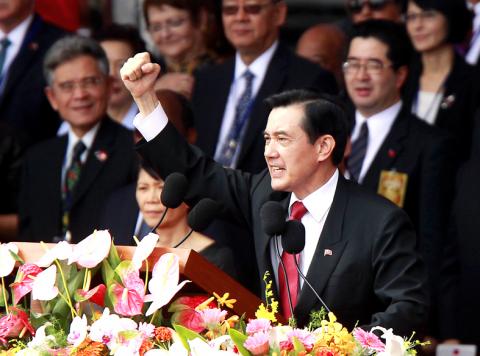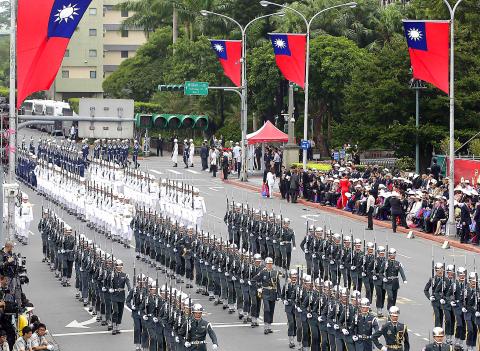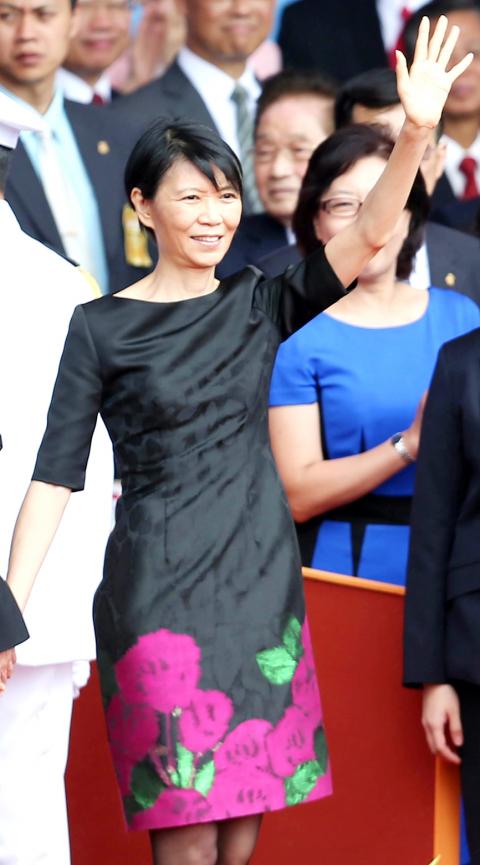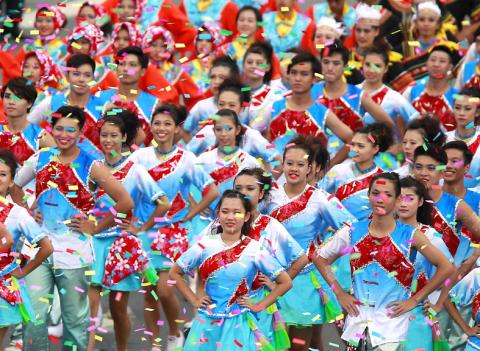President Ma Ying-jeou (馬英九) criticized the social movements the nation has seen in recent years during yesterday’s Double Ten National Day speech, labeling them obstructionist groups that hindered the economy and engaged in “undemocratic” behavior.
To mark the 103rd anniversary of the founding of the Republic of China (ROC), Ma delivered a speech titled “Proud of Our Democracy, Proud of Taiwan” at a Taipei ceremony, which was attended by more than 400 foreign dignitaries, including Burkinabe President Blaise Compaore and Paraguayan President Horacio Cartes.
Much of the speech was devoted to how the adoption of a constitutional democracy has built today’s Taiwan, a feat Ma said would “serve as a guidepost for ethnic Chinese societies,” despite the challenges the nation has faced in its democratic development in recent years.

Photo: Reuters
“In the last year or two, protesters have resorted to some extremely zealous and illegal actions that ignored the lawful interests of people with different opinions,” Ma said. “In some cases, they went so far as to occupy government buildings.”
The latter part of Ma’s comments were an apparent reference to the student-led Sunflower movement, which occupied the main chamber of the legislature in March and April to protest the government’s handling of the cross-strait service trade agreement.
“Such undemocratic behavior has generated needless conflict, and allowed a minority to prevent legislative deliberations on many pending bills,” Ma said.

Photo: Reuters
While countries are pressing to establish economic and trade alliances, and take part in regional economic integration, Taiwan has remained at a standstill on this front, Ma added.
Ma said that a number of policies must be pursued to increase the nation’s economic integration with other countries, including proposals to restructure industries and make more value-added products, carry out deregulation and open up markets, “[and these] cannot be debated rationally” with such protests.
“What we have encountered ... is pure obstructionism that has made progress impossible,” Ma said. “If those who oppose our policies refuse to engage in discussion and are unable to propose any alternative, then they are not acting in the spirit of democracy, and Taiwan can only watch helplessly as its competitive advantages slip away.”

Photo: CNA
Ma urged the opposition camp to return to democratic constitutionalism.
“Let us all stay within the system and communicate with sincerity,” he said, adding that his administration is “quite willing to uphold democracy by talking with people from all walks of life in a spirit of complete candor.”
Ma also said that China should move toward constitutional democracy and honor pledges it made to Hong Kong when the territory was returned to China in 1997 that for 50 years it would allow “rule of Hong Kong by the people of Hong Kong,” “a high degree of autonomy” and “election of the chief executive through universal suffrage.”

Photo: Reuters
Ma said Beijing should take note that “now is the most appropriate time to move towards constitutional democracy” because China is experiencing rapid economic growth and its people lead affluent lives.

MAKING WAVES: China’s maritime militia could become a nontraditional threat in war, clogging up shipping lanes to prevent US or Japanese intervention, a report said About 1,900 Chinese ships flying flags of convenience and fishing vessels that participated in China’s military exercises around Taiwan last month and in January last year have been listed for monitoring, Coast Guard Administration (CGA) Deputy Director-General Hsieh Ching-chin (謝慶欽) said yesterday. Following amendments to the Commercial Port Act (商港法) and the Law of Ships (船舶法) last month, the CGA can designate possible berthing areas or deny ports of call for vessels suspected of loitering around areas where undersea cables can be accessed, Oceans Affairs Council Minister Kuan Bi-ling (管碧玲) said. The list of suspected ships, originally 300, had risen to about

DAREDEVIL: Honnold said it had always been a dream of his to climb Taipei 101, while a Netflix producer said the skyscraper was ‘a real icon of this country’ US climber Alex Honnold yesterday took on Taiwan’s tallest building, becoming the first person to scale Taipei 101 without a rope, harness or safety net. Hundreds of spectators gathered at the base of the 101-story skyscraper to watch Honnold, 40, embark on his daredevil feat, which was also broadcast live on Netflix. Dressed in a red T-shirt and yellow custom-made climbing shoes, Honnold swiftly moved up the southeast face of the glass and steel building. At one point, he stepped onto a platform midway up to wave down at fans and onlookers who were taking photos. People watching from inside

Japan’s strategic alliance with the US would collapse if Tokyo were to turn away from a conflict in Taiwan, Japanese Prime Minister Sanae Takaichi said yesterday, but distanced herself from previous comments that suggested a possible military response in such an event. Takaichi expressed her latest views on a nationally broadcast TV program late on Monday, where an opposition party leader criticized her for igniting tensions with China with the earlier remarks. Ties between Japan and China have sunk to the worst level in years after Takaichi said in November that a hypothetical Chinese attack on Taiwan could bring about a Japanese

The WHO ignored early COVID-19 warnings from Taiwan, US Deputy Secretary of Health and Human Services Jim O’Neill said on Friday, as part of justification for Washington withdrawing from the global health body. US Secretary of State Marco Rubio on Thursday said that the US was pulling out of the UN agency, as it failed to fulfill its responsibilities during the COVID-19 pandemic. The WHO “ignored early COVID warnings from Taiwan in 2019 by pretending Taiwan did not exist, O’Neill wrote on X on Friday, Taiwan time. “It ignored rigorous science and promoted lockdowns.” The US will “continue international coordination on infectious